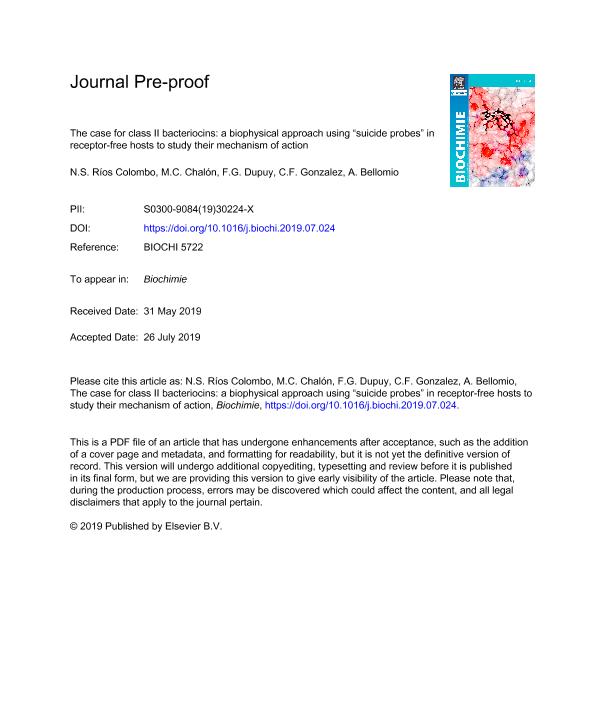Artículo
The case for class II bacteriocins: A biophysical approach using “suicide probes” in receptor-free hosts to study their mechanism of action
Ríos Colombo, Natalia Soledad ; Chalon, Miriam Carolina
; Chalon, Miriam Carolina ; Dupuy, Fernando Gabriel
; Dupuy, Fernando Gabriel ; Gonzalez, Claudio Fabricio
; Gonzalez, Claudio Fabricio ; Bellomio, Augusto
; Bellomio, Augusto
 ; Chalon, Miriam Carolina
; Chalon, Miriam Carolina ; Dupuy, Fernando Gabriel
; Dupuy, Fernando Gabriel ; Gonzalez, Claudio Fabricio
; Gonzalez, Claudio Fabricio ; Bellomio, Augusto
; Bellomio, Augusto
Fecha de publicación:
10/2019
Editorial:
Elsevier B.V.
Revista:
Biochimie
ISSN:
0300-9084
e-ISSN:
6183-1638
Idioma:
Inglés
Tipo de recurso:
Artículo publicado
Clasificación temática:
Resumen
Class II bacteriocins are unmodified membrane-active peptides that act over a narrow spectrum of target bacteria. They bind a specific receptor protein on the membrane to form a pore, leading to membrane permeabilization and cell death. However, little is known about the molecular events triggering the pore formation after the bacteriocin recognizes the receptor. It is not clear yet if the pore is the same receptor forced into an open conformation or if the pore results from the bacteriocin insertion and oligomeric assembly in the lipid bilayer. In order to reveal which model is more suitable to explain the toxicity mechanism, in this work we use chimeric peptides, resulting from the fusion of the bitopic membrane protein EtpM with different class II bacteriocins: enterocin CRL35, pediocin PA-1 and microcin V. E. coli strains lacking the specific receptors for these bacteriocins were chosen as expression hosts. As these constructs display a lethal effect when they are heterologously expressed, they are called “suicide probes”. The results suggest that, indeed, the specific receptor would act as a docking molecule more than as a structural piece of the pore, as long as the bacteriocin is somehow anchored to the membrane. These set of chimeric peptides also represent an in vivo system that allows to study the interaction of the bacteriocins with real bacterial membranes, instead of model membranes. Hence, the effects of these suicide probes in membrane fluidity and transmembrane potential were also assessed, using fluorescence spectroscopy. The data show that the different suicide probes are able to increase phospholipid order and depolarize the membranes of receptor-free bacterial cells.
Palabras clave:
LAURDAN
,
MICROCIN
,
PEDIOCIN
,
ENTEROCIN
,
MECHANISM OF ACTION
,
TRANSMEMBRANE POTENTIAL
Archivos asociados
Licencia
Identificadores
Colecciones
Articulos(INSIBIO)
Articulos de INST.SUP.DE INVEST.BIOLOGICAS
Articulos de INST.SUP.DE INVEST.BIOLOGICAS
Citación
Ríos Colombo, Natalia Soledad; Chalon, Miriam Carolina; Dupuy, Fernando Gabriel; Gonzalez, Claudio Fabricio; Bellomio, Augusto; The case for class II bacteriocins: A biophysical approach using “suicide probes” in receptor-free hosts to study their mechanism of action; Elsevier B.V.; Biochimie; 165; 10-2019; 183-195
Compartir
Altmétricas



